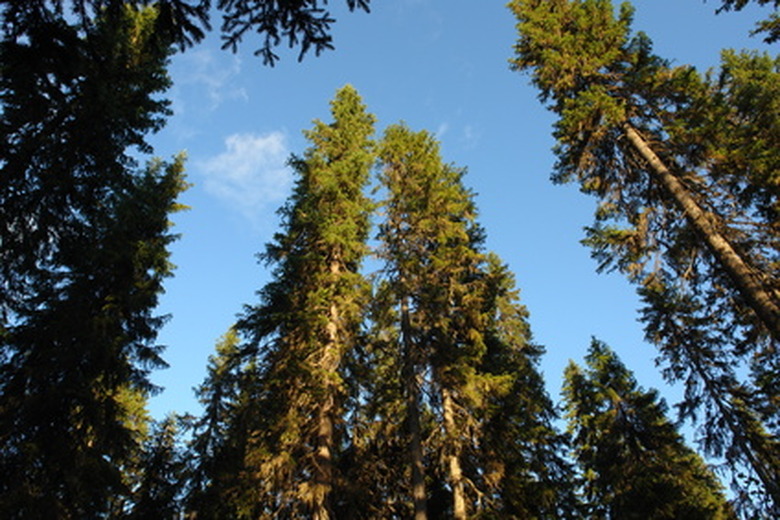Chemicals That Kill Mature Pine Trees
We may receive a commission on purchases made from links.
Killing any tree seems a shame, but pine trees can become diseased, overgrown or may be situated in an inconvenient area. Killing a mature pine tree can be difficult. Forest management professionals sometimes resort to burns, banding and chemical treatments and yet often the trees still come back. The most important thing to remember if using chemicals that kill mature pine trees is to avoid poisoning anything else. Wind drift and soil contamination can cause problems for the desirable plants that you don't want to harm.
Glysophate – Round Up
Glysophate – Round Up
Forest managers use Round Up (active ingredient glysophate) as a chemical pine tree control. Round Up enters the plant through its foliar structure, so the herbicide has to hit the needles to penetrate into the tree's system and kill it. The process will be slow and the pine could rally and survive the poisoning while you're waiting for it to go to work. You can also use a 1/2-inch drill and make holes around the trunk and pour in liquid glysophate. The holes must penetrate the cambium to be effective and you must be careful not to get any on vegetation surrounding the tree. This is a very effective control for pine trees.
Metsulfuron – Escort and Matrix
Metsulfuron – Escort and Matrix
Metsulfuron is the active ingredient in a few industrial herbicides such as Escort and Matrix. It is being used in the UK for pine tree management. It is similar in use to the glysophate but you only need to drill two or three holes and it kills the tree much faster. It is used in a highly concentrated form to achieve the quick-acting effect.
Nitrogen Fertilizer Method
Nitrogen Fertilizer Method
This method takes a long time but is less toxic. Again, drill holes around the trunk and fill them with nitrogen fertilizer. Keep the holes moist with a mister and eventually the compound will cause the tree to grow a fungus that decomposes the wood. This method is not recommended if you want to kill the tree quickly. It is appropriate for a pine tree or any other tree.
2,4-D as a Foliar Spray
2,4-D as a Foliar Spray
This chemical may require re-treatment but it can be used in a foliar spray, cut method or injection. It can cause problems with drift so use caution. If you want something stronger, 2,4-D is mixed with tichlophyr as Crossbow or Garlon. Use Crossbow in pasture and range land pine removal and the Garlon in forests to thin pine stands. Do not use near cropland.
Imazypyr for Pine Plantation Management
Imazypyr for Pine Plantation Management
Imazypyr is recommended by the University of Florida for pine plantation management. It can be used alone to kill mature pine trees or works well in combination with glysophate for a quicker kill. Pine plantation management can be part of silviculture, which is optimal management to grow healthy trees. This often means removal of taller pines to let in more light and other vegetative culling.
Safety When Using Chemicals
Safety
When Using Chemicals
Wear protective gear and clothing when applying chemicals that kill mature pine trees. Don long pants, boots and long-sleeved shirt. Always use sturdy gloves and protective goggles. Wash your hands thoroughly with soap and water after handling chemicals. If the job is too much for you, don't hesitate to hire a competent certified professional with good references to apply chemicals.
References
- Washington State University Extension: Chemical Control for Woody Plants, Trees, Stumps
- University of Florida Extension: Primer on Chemical Vegetation Management on Florida Pine Plantations.
- Monster Guide: How to Kill a Tree
- Sound Restoration: Poisoning Wilding Radiata Pine
- North Dakota State University: Pesticide Safety – A Guide for Gardeners and Homeowners
